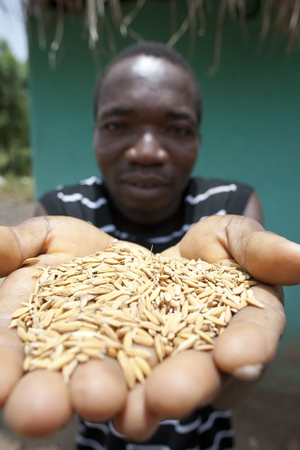Can Africa Feed Itself?
Malawi President Mutharika outlines five-year plan

Does Africa have the potential to feed itself? Yes, and in the near future, says Bingu wa Mutharika, president of Malawi and chairperson pro tempore of the African Union, who outlined his “African Food Basket” plan before an overflow crowd at a Boston University luncheon and videoconference on October 1.
“Africa is not poor,” said Mutharika, who has been Malawi’s president since 2004 and has a degree in economics. The continent, he says, “has decided to shift from Afro-pessimism to Afro-optimism.” Speaking at the invitation of BU’s African Presidential Archives and Research Center (APARC), Mutharika told the group, which included University President Robert A. Brown and Charles Yancey, a Boston city councilor, that if implemented, the plan will lead to African food security in five years. Mutharika introduced his proposal at the United Nations in New York earlier in the week.
The president of the southeastern African nation outlined a strategy incorporating subsidies to small farmers, especially women, improvements in irrigation, distribution of sturdy hybrid seeds, building and upgrading of roads, a push toward alternative clean energy sources, such as wind and solar, an increased continent-wide investment in communications technology, and the establishment of a strategic partnership comprising nations such as Uganda, Egypt, Ethiopia, Ghana, and Zimbabwe, which Mutharika cites as having “track records of achievement in promoting agriculture and food security.”
Who will foot the bill? The plan would rely on support by the G-8 group of industrialized nations (Canada, France, Germany, Great Britain, Italy, Japan, Russia, and the United States), specifically its 2009 Aquila Food Security Initiative, which pledges $20 billion for agricultural development in Africa.
“The Africa you have been made to know is the Africa of incessant calamities…the Africa where many children die before the age of five years, the Africa of conflicts, terrorism, and piracy, and indeed, the Africa of underdevelopment and extreme poverty,” said Mutharika. “But I want you now to begin to know a new Africa,” he went on, promising that his “mega-investment” project will encompass all African countries and involve “the purchase of tractors, agricultural implements, irrigation equipment…improved seeds, cement for dam construction, water pumps, pipes, and trucks.”
“What President Mutharika hopes to accomplish is really rather straightforward and simple,” said Charles Stith, director of APARC and a former U.S. ambassador to Tanzania.
James McCann, a College of Arts & Sciences history professor and interim director of the African Studies Center, said that since taking office, Mutharika is credited with making significant improvements in the agriculture-based economy of Malawi, a nation of 15 million. But Mutharika’s plan is overly simplistic and ignores realities like political instability and severe energy shortages, said the author of several books on African agriculture, including Maize and Grace: Africa’s Encounter with a New World Crop, 1500-2000.
McCann has worked with African farmers in Ethiopia and Malawi’s neighbor Zimbabwe, and has reservations about the plan, questioning Mutharika’s call for subsidies to small farmers. Such subsidies did help Malawi became a net exporter of maize and tobacco, he said, but when the International Monetary Fund warned Malawi about its growing debt, subsidies were cut. The plan’s general points echo other far-reaching initiatives, according to McCann, especially Alliance for a Green Revolution in Africa, or AGRA, a joint effort launched in 2006 by the Rockefeller Foundation and the Bill and Melinda Gates Foundation. “AGRA is the private version, and Mutharika’s is the government version,” he said. And in his speech, Mutharika made no mention of the need for political stability, which is crucial to such broad initiatives, said McCann; civil conflicts and displaced populations hamper efforts at land reform. As well, he said, the proposals for increased irrigation and energy production belie the fact that in Africa, hydroelectric power and agriculture compete.
At a press conference following his speech, Mutharika said he believes the plan will end Africa’s reliance on food aid and serve as a model for the world. “We’ll see Americans investing in Africa,” Mutharika predicted. “They are certainly welcome in Malawi.”
Susan Seligson can be reached at sueselig@bu.edu.
Comments & Discussion
Boston University moderates comments to facilitate an informed, substantive, civil conversation. Abusive, profane, self-promotional, misleading, incoherent or off-topic comments will be rejected. Moderators are staffed during regular business hours (EST) and can only accept comments written in English. Statistics or facts must include a citation or a link to the citation.